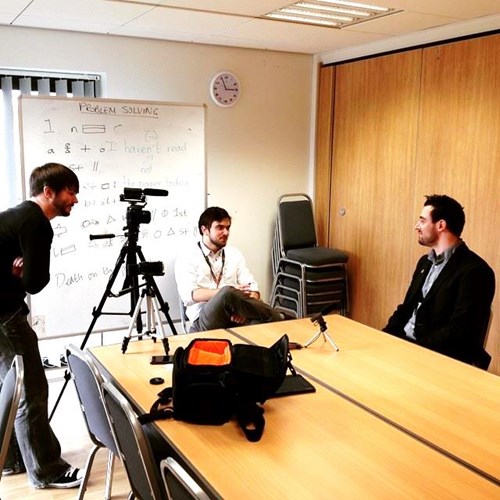Group Size
?
1.) Small group (teams of 4-6)
2.) Individual Task
3.) Large Group
4.) Any
Any
Learning Environment
?
1.) Lecture Theatre
2.) Presentation Space
3.) Carousel Tables (small working group)
4.) Any
5.) Outside
6.) Special
Any
QAA Enterprise Theme(s)
?
1.) Creativity and Innovation
2.) Opportunity recognition, creation and evaluation
3.) Decision making supported by critical analysis and judgement
4.) Implementation of ideas through leadership and management
5.) Reflection and Action
6.) Interpersonal Skills
7.) Communication and Strategy
1Creativity and Innovation
7Communication and Strategy
Many students of art, media and design at Glyndwr University go on to become self-employed; either as professional artists, as freelancers working for a variety of design firms, or through creating their own businesses. Given the nature of their industry, almost all will be required to work for themselves at some point as they pursue a creative career.
However, on arriving at University, many have limited or no previous knowledge, understanding or experience of enterprise, and many lack confidence and self-belief in their own abilities.
Much work is done throughout the duration of students’ studies at the University to develop these students’ skills and equip them appropriately for their future endeavours.
One part of this approach is through peer to peer learning through film. Students often engage well with information, when relayed by their peers, who share common interests, experiences, and reference points. Working with ZONE, Glyndwr University’s enterprise support service, a series of film were produced, featuring current students and recent graduates of art, media and design programmes, who had achieved success in the development of new enterprises, or in the early stages of their freelance careers.
These films had a target audience of new creative students, and communicated key information, regarding the personal learning journeys of the individuals, their successes and failures, how they had started out, and how they engaged with the support available to them at the University. Their aim was to encourage new students to generate ideas for their own future enterprises, to follow the actions taken by their peers, and to utilise the support available to them at the University.
The films were disseminated widely, and achieved their desired effect. A secondary impact was the benefit of the project to the students and graduates who featured in the films, who developed their own communication skills, were given the opportunity to reflect on their own learning journey, and equipped with a valuable resource for the promotion of their products and services.
Film Planning
Film Production

Figure 1: Filming in Progress
Film Dissemination

Figure 2: Title Shots from the Completed Films
The films have proven an excellent resource. To date, they have received over 1000 view through social media, and through their integration into talks, lectures and workshops, have been seen by many thousands of learners. This level of peer-to-peer engagement would not have been logistically possible without these films.
The direct connection learners have to the individuals featuring in the films makes their messages potent, and the information they communicate regarding starting up in business is invaluable. Following the production of the films featuring students of Art, Media and Design, additional films were made (following the same pattern as outlined above), with students of Business and Computing (and their businesses Creative Catalysts and Giggles and Games), allowing the good practice to be shared between departments.
The individuals who featured in the films were all very pleased with the results, and all went on to use the films for their own promotional purposes.
The graduate business who created the films (Filmage) were able to enhance their own reputation and networks through the project, leading to further work for them and supporting the development of their own business.
The peer to peer learning fostered through the films achieved its desired effect. Prospective students, new students, and even more experienced students heard directly from their peers that self-employment was a viable option, and were told the steps they needed to take to make it happen. Many have subsequently engaged with the enterprise service at the University, and cited these films as a contributory factor.
For the participants who featured in the films, the exercise was a valuable learning experience too, with many reporting the confidence they had gathered as a result, as well as bolstered skills in communication to support their future endeavours.
With thanks to the School of Art, Media and Design, Glyndwr University, Joe Edwards (www.filmage.co.uk) and the students and graduates who featured in the films.